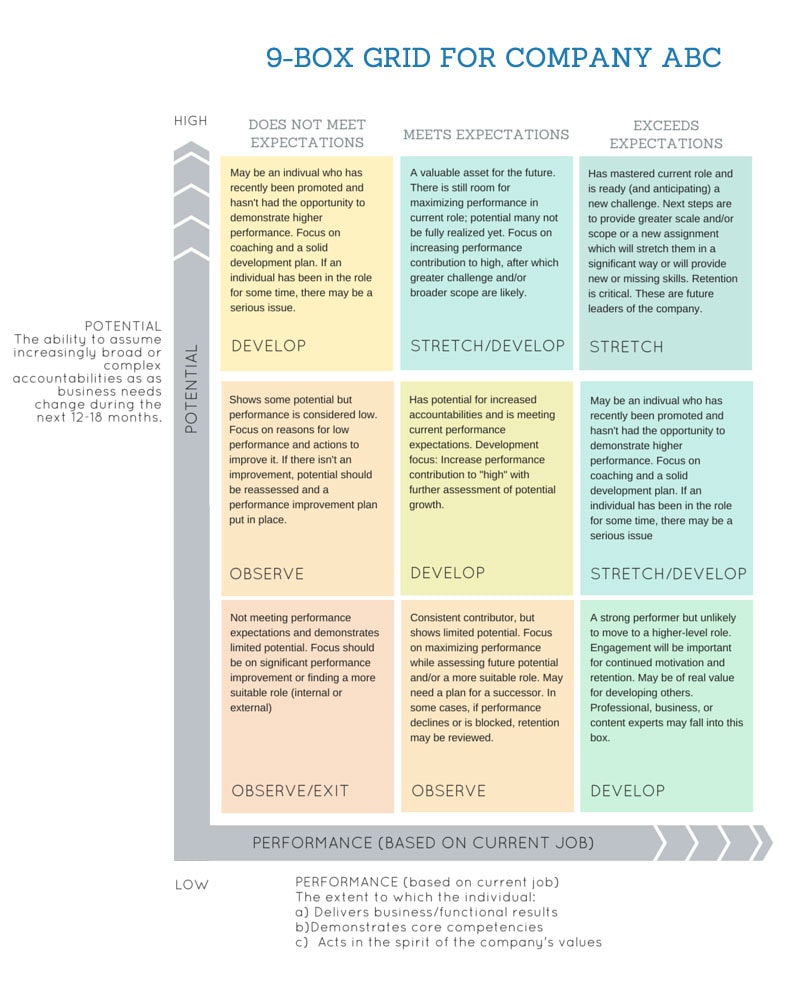
Most Organisations are managed for Mediocrity. Don’t take my word for it though, check out the research by Keller and Price from McKinsey who share my view.1
Now that’s a BIG statement but as you are finishing collating, analysing and reporting on this half-year’s Performance Appraisal results you may just be starting to nod your head in agreement.
Just how many average performers have you got?
The Nine Box Grid System
Of course, you can always lower the performance bar and then even the most deleterious can look a bit good, but I wouldn’t suggest that as a strategy!
Standardising performance management
A very common problem is a disparity in how people are rated by their managers. Often the underlying cause is that there is no mandated organisation wide performance grading system such as the 9 box grid shown in the following diagram.2

The 9-Box Grid or Matrix system focuses on developing a matrix to standardise the measurement of performance versus potential.
By dividing up the measurement of current performance and future estimated potential into realisitc expectations you can then assign values to those expectations and come to a final conclusion.
The idea is that you need to ascertain whether the team member needs to be observed, developed, or pushed (stretched) to achieve better results.
Performance versus Potential
Performance is based on the current job. This is the extent to which the team member delivers functiona results, demonstrates core compentencies and acts in line with the company’s core values.
Potential is the ability to undertake increasingly broad or advanced accountabilites as the business needs during the next 12 – 18 months.
9-Box Matrix for measuring performance
Does Not Meet Expectations |
|
|---|---|
| Not meeting performance expectations |
| Demonstrates limited potential | |
| Focus on significant performance improvement or find more suitable role | |
Action: Observe or Exit |
|
| Performance is low |
| Demonstrates some potential | |
| Focus on performance improvement and eliminating potential barriers, implement performance improvement plan | |
Action: Observe |
|
| Possible barriers to performance (lack of time/experience) |
| Demonstrates high potential | |
| Focus on coaching and creating a development plan | |
Action: Develop |
|
Meets Expectations |
|
|---|---|
| Consistently contributes |
| Demonstrates limited potential | |
| Focus on performance improvement and assess future potential. | |
Action: Observe |
|
| Meeting objectives |
| Demonstrates possibilities for advancement | |
| Focus on development and performance improvement for potential future growth. | |
Action: Observe |
|
| Possible valuable asset for future |
| Potential may not be fully utilised yet | |
| Focus on achieving high performance | |
Action: Stretch/Develop |
|
Exceeds Expectations |
|
|---|---|
| Strong performer |
| Probably stunted potential/growth | |
| Focus on engagement. May be an asset to help develop others. | |
Action: Observe |
|
| Performing well - possible barriers to performance (lack of time/experience) |
| Demonstrates possibilities for advancement | |
| Focus on coaching and creating a development plan | |
Action: Stretch/Development |
|
| Mastered current role |
| Ready for new/bigger challenge | |
| Focus on providing opportunities for greater scale, scope and/or skilling | |
Action: Stretch |
|
Barriers to a great performance management system
In addition to the disparity in treatment of team member performance by their managers, a lack of mandated, standard and universally applied KPIs is also a major underlying cause. KPIs can vary wildly from manager to manager and across departments.
Both of these factors contribute to compromised performance data being generated from the performance management system.
The problems with adage “If you can’t measure it you can’t manage it” starts when the integrity of the measures is compromised.
But as you are reviewing your current results (you are doing a system review aren’t you?), you may consider introducing a 9 box grid3 into your system that measures performance and potential.
This will help bring your KPIs and performance expectations into line across the board and foster positive working relationships (and hopefully – productivity!).
Learn how to implement the 9 Box Grid
If you’re looking to get confident with your performance management system, upskill with the College for Adult Learning’s nationally accredited Project Management or HR Management Diploma. You’ll learn how to implement the 9 box model, review, update and evaluate your current performance management system, develop agreed and mandated KPIs and train managers and supervisors to provide meaningful input and feedback into the performance review system.
- Keller, S. Price, C. Beyond Performance: How Great Organisations Build Ultimate Competitive Advantage John Wiley & Co May 2011NY [↩]
- Halogen Software Proven tools for identifying and developing your organisation’s talent pipeline. Accessed 29th April 2015. http://www.halogensoftware.com/au/learn/how-to/proven-tools-for-identifying-and-developing-your-organizations-talent-pipeline [↩]
- Great Leadership. The Performance and Potential Matrix (9 Box Model) – An Update. Accessed 29/04/15. http://www.greatleadershipbydan.com/2012/01/performance-and-potential-matrix-9-box.html [↩]
